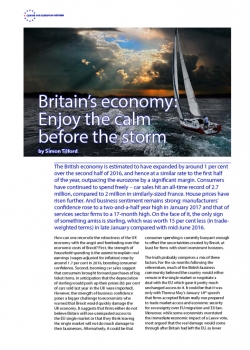
Britain's economy: Enjoy the calm before the storm
Britain's economy has not weathered the Brexit storm. But the calm before the storm has lasted longer than many economists expected.
The British economy is estimated to have expanded by around 1 per cent over the second half of 2016, and hence at a similar rate to the first half of the year, outpacing the eurozone by a significant margin. Consumers have continued to spend freely – car sales hit an all-time record of 2.7 million, compared to 2 million in similarly-sized France. House prices have risen further. And business sentiment remains strong: manufacturers’ confidence rose to a two-and-a-half year high in January 2017 and that of services sector firms to a 17-month high. On the face of it, the only sign of something amiss is sterling, which was worth 15 per cent less (in trade-weighted terms) in late January compared with mid-June 2016.
How can one reconcile the robustness of the UK economy with the angst and foreboding over the economic costs of Brexit? First, the strength of household spending is the easiest to explain: real earnings (wages adjusted for inflation) rose by around 1.7 per cent in 2016, boosting consumer confidence. Second, booming car sales suggest that consumers brought forward purchases of big ticket items, in anticipation that the depreciation of sterling would push up their prices (85 per cent of cars sold last year in the UK were imported). However, the strength of business confidence poses a bigger challenge to economists who warned that Brexit would quickly damage the UK economy. It suggests that firms either do not believe Britain will lose unimpeded access to the EU single market or that they think leaving the single market will not do much damage to their businesses. Alternatively, it could be that consumer spending is currently buoyant enough to offset the uncertainties created by Brexit, at least for firms with short investment horizons.
The truth probably comprises a mix of these factors. For the six months following the referendum, much of the British business community believed the country would either remain in the single market or negotiate a deal with the EU which gave it pretty much unchanged access to it. It could be that it was only with Theresa May’s January 18th speech that firms accepted Britain really was prepared to trade market access and economic security for sovereignty over EU migration and EU law. Moreover, while some economists overstated the immediate economic impact of a Leave vote, most argued that the real damage would come through after Britain had left the EU, as lower trade and investment hit UK productivity and living standards.
Brexit Britain won't escape serious and permanent damage to its foreign trade & investment.
So what will now happen? The impact on prices and real earnings from the fall in the value of sterling only started to feed through at the end of 2016. Over the course of 2017 real wage growth will stagnate as rising import prices push up inflation. So far, the weakness of sterling has not boosted exports and there are several reasons why the hoped for export boom will not materialise. Over the last 20 years, the composition of British exports has shifted strongly towards services and intermediate manufactured goods, demand for which is less sensitive to changes in the value of sterling. And global trade growth has weakened sharply, as the integration of big emerging markets such as China into the global trading system has run its course, and might weaken further with rising protectionism.
The spectre of Brexit will inevitably start having a chilling effect on UK exporters’ investment, especially in services, and for businesses with long investment horizons. Britain is heading out of the single market and the customs union and, in all likelihood, will only succeed in negotiating a free trade agreement (FTA) in goods, but not much beyond that. Financial institutions appear to have taken May’s January speech as confirmation that they will lose so-called passporting rights, which enable them to sell their services unhindered across the EU while being regulated in the UK. A number of banks responded to the speech by announcing that they will now relocate some business out of London and into the eurozone.
Even if Britain manages to negotiate an FTA covering goods, UK-based manufacturers will have to comply with rules of origin. These determine whether tariffs should be charged on goods that have significant content imported from outside the EU. Their imposition will disrupt the complex supply-chains that British firms are as much a part of as other members of the EU.
Finally, the British government’s decision to tighten up visa requirements for foreign students in an attempt to cut net immigration will damage the country’s higher education sector, one of its most successful. It will also hit the British economy as a whole by depriving it of large numbers of highly-skilled workers. By placing restrictions on the free flow of labour between the UK and the rest of Europe, the UK will become a less attractive country to European workers, even those who would qualify for whatever regime for skilled immigrants the UK eventually puts in place.
Britain’s economy hasn’t weathered the Brexit storm. It is still enjoying the calm before the storm.
The British economy has not weathered the Brexit storm. It is just that the calm before the storm has lasted a bit longer than many had assumed. There is no reason to think Britain will escape serious and permanent damage to its foreign trade and investment and hence living standards. Meanwhile, the Brexit negotiations will be a massive distraction from Britain’s real economic problems: skills, housing, infrastructure, inequality and corporate governance.
Simon Tilford is deputy director of the Centre for European Reform.

